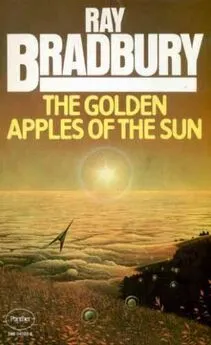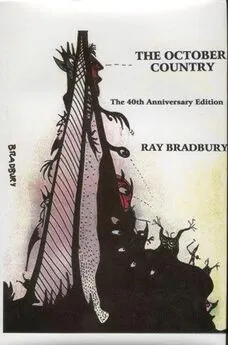Рэй Бредбери - Золотые яблоки солнца (The Golden Apples of the Sun), 1953
- Название:Золотые яблоки солнца (The Golden Apples of the Sun), 1953
- Автор:
- Жанр:
- Издательство:неизвестно
- Год:неизвестен
- ISBN:нет данных
- Рейтинг:
- Избранное:Добавить в избранное
-
Отзывы:
-
Ваша оценка:
Рэй Бредбери - Золотые яблоки солнца (The Golden Apples of the Sun), 1953 краткое содержание
В этом сборнике писатель позволяет себе отойти от научной фантастики, публикуя реалистичные истории, сказки и детективы, а фантастические рассказы сводя к зарисовкам («Вышивание»). Отличная книга, в которой видны, пожалуй, все грани Брэдбери-прозаика. В 2005-м году был переиздан под названием «И грянул гром» в преддверии выхода экранизации этого рассказа.
Золотые яблоки солнца (The Golden Apples of the Sun), 1953 - читать онлайн бесплатно полную версию (весь текст целиком)
Интервал:
Закладка:
– Нет, я не милосерден, – возразил император. Он смотрел, как за садовой оградой слуги сжигают прекрасную, пахнущую утренним ветром машину из бумаги и тростника. Видел темный дым, поднимающийся к небу. – Нет, я в отчаянии и очень испуган. – Он смотрел, как слуги роют яму, чтобы схоронить пепел. – Что такое жизнь одного человека в сравнении с жизнью миллионов! Пусть эта мысль будет мне утешением.
Он снял ключик с цепочки на шее и снова завел механизм чудесного сада. Стоял и глядел вдаль, на Великую стену, на миролюбивый город, на зеленые поля, на реки и дороги. Вздохнул. Крохотный механизм зажужжал, и сад ожил. Под деревьями гуляли человечки, на залитых солнцем полянках мелькали зверьки в блестящих шубках, а в ветвях деревьев порхали голубые и золотистые птички и кружились в маленьком небе.
– Ах! – вздохнул император, закрывая глаза. – Ах эти птички, птички…
The Murderer 1953
Music moved with him in the white halls. He passed an office door: "The Merry Widow Waltz." Another door: "Afternoon of a Faun." A third: "Kiss Me Again." He turned into a cross corridor: "The Sword Dance" buried him in cymbals, drums, pots, pans, knives, forks, thunder, and tin lightning. All washed away as he hurried through an anteroom where a secretary sat nicely stunned by Beethoven's Fifth. He moved himself before her eyes like a hand, she didn't see him.
His wrist radio buzzed.
"Yes?"
"This is Lee, Dad. Don't forget about my allowance."
"Yes, son, yes. I'm busy."
"Just didn't want you to forget, Dad," said the wrist radio. Tchaikovsky's "Romeo anil Juliet" swarmed about the voice and flushed into the long halls.
The psychiatrist moved in the beehive of offices, in the cross-pollination of themes, Stravinsky mating with Bach, Haydn unsuccessfully repulsing Rachmaninoff, Schubert slain by Duke Ellington. He nodded to the humming secretaries and the whistling doctors, fresh to their morning work. At his office he checked a few papers with his stenographer, who sang under her breath, then phoned the police captain upstairs. A few minutes later a red light hunked, a voice said from the ceiling:
"Prisoner delivered to Interview Chamber Nine."
He unlocked the chamber door, stepped in, heard the door lock behind him.
"Go away," said the prisoner, smiling.
The psychiatrist was shocked by that smile. A very sunny, pleasant warm thing, a thing that shed bright light upon the room. Dawn among the dark hills. High noon at midnight, that smile. The blue eyes sparkled serenely above that display of self-assured dentistry.
"I'm here to help you," said the psychiatrist, frowning. Something was wrong with the room. He had hesitated the moment he entered. He glanced around. The prisoner laughed. "If you're wondering why it's so quiet in here, I just kicked the radio to death."
Violent, thought the doctor.
The prisoner read this thought, smiled, put out a gentle hand. "No, only to machines that yak-yak-yak."
Bits of the wall radio's tubes and wires lay on the gray carpeting. Ignoring these, feeling that smile upon him like a heat lamp, the psychiatrist sat across from his patient in the unusual silence which was like the gathering of a storm.
"You're Mr. Albert Brock, who calls himself The Murderer?"
Brock nodded pleasantly. "Before we start…." He moved quietly and quickly to detach the wrist radio from the doctor's arm. He tucked it in his teeth like a walnut, gritted and heard it crack, banded it back to the appalled psychiatrist as if he had done them both a favor. "That's better."
The psychiatrist stared at the ruined machine. "You're running up quite a damage bill."
"I don't care," smiled the patient. "As the old song goes: "Don't Care What Happens to Me!" He hummed it.
The psychiatrist said: "Shall we start?"
"Fine. The first victim, or one of the first, was my telephone. Murder most foul. I shoved it in the kitchen Insinkerator! Stopped the disposal unit in mid-swallow. Poor thing strangled to death. After that I shot the television set!"
The psychiatrist said, "Mmm."
"Fired six shots right through the cathode. Made a beautiful tinkling crash, like a dropped chandelier."
"Nice imagery."
"Thanks, I always dreamt of being a writer."
"Suppose you tell me when you first began to hate the telephone."
"It frightened me as a child. Uncle of mine called it the Ghost Machine. Voices without bodies. Scared the living hell out of me. Later in life I was never comfortable. Seemed to me a phone was an impersonal instrument. If it _felt_ like it, it let your personality go through its wires. If it didn't _want_ to, it just drained your personality away until what slipped through at the other end was some cold fish of a voice all steel, copper, plastic, no warmth, no reality. It's easy to say the wrong thing on telephones; the telephone changes your meaning on you. First thing you know, you've made an enemy. Then, of course, the telephone's such a _convenient_ thing; it just sits there and _demands_ you call someone who doesn't want to be called. Friends were always calling, calling, calling me. Hell, I hadn't any time of my own. When it wasn't the telephone it was the television, the radio, the phonograph. When it wasn't the television or radio or the phonograph it was motion pictures at the corner theater, motion pictures projected, with commercials on low-lying cumulus clouds. It doesn't rain rain any more, it rains soapsuds. When it wasn't High-Fly Cloud advertisements, it was music by Mozzek in every restaurant; music and commercials on the busses I rode to work. When it wasn't music, it was inter-office communications, and my horror chambers of a radio wrist watch on which my friends and my wife phoned every five minutes. What is there about such 'conveniences' that makes them so _temptingly_ convenient? The average man thinks? Here I am, time on my hands, and there on my wrist is a wrist telephone, so why not just buzz old Joe up, eh? "Hello, hello!" I love my friends, my wife, humanity, very much, but when one minute my wife calls to say, 'Where are you _now_ dear?' and a friend calls and says, 'Got the best off-color joke to tell you. Seems there was a guy -' And a stranger calls and cries out, 'This is the Find-Fax Poll. What gum are you chewing at this very _instant_!' Well!"
"How did you feel during the week?"
"The fuse lit. On the edge of the cliff. That same afternoon I did what I did at the office."
"Which was?"
"I poured a paper cup of water into the intercommunications system."
The psychiatrist wrote on his pad.
"And the system shorted?"
"Beautifully! The Fourth of July on wheels! My God, stenographers ran around looking _lost_! What an uproar!"
"Felt better temporarily, eh?"
"Fine! Then I got the idea at noon of stamping my wrist radio on the sidewalk. A shrill voice was just yelling out of it at me, 'This is People's Poll Number Nine. What did you eat for lunch?' when I kicked the Jesus out of the wrist radio!"
"Felt even _better_, eh?"
"It _grew_ on me!" Brock rubbed his hands together. "Why didn't I start a solitary revolution, deliver man from certain 'conveniences'? 'Convenient for whom?' I cried. Convenient for friends: 'Hey, Al, thought I'd call you from the locker room out here at Green Hills. Just made a sockdolager hole in one! A hole in one, Al! A _beautiful_ day. Having a shot of whiskey now. Thought you'd want to know, Al!' Convenient for my office, so when I'm in the field with my radio car there's no moment when I'm not in touch. In _touch_! _There's_ a slimy phrase. Touch, hell. _Gripped!_ Pawed, rather. Mauled and massaged and pounded by FM voices. You can't leave your car without checking in: 'Have stopped to visit gas-station men's room.' 'Okay, Brock, step on it!' 'Brock, what _took_ you so long?' 'Sorry, sir.' 'Watch it next time, Brock.' 'Yes, sir!' So, do you know what I did, Doctor? I bought a quart of French chocolate ice cream and spooned it into the car radio transmitter."
"Was there any _special_ reason for selecting French chocolate ice cream to spoon into the broadcasting unit?"
Brock thought about it and smiled. "It's my favorite flavor."
"Oh," said the doctor.
"I figured, hell, what's good enough, for me is good enough for the radio transmitter."
"What made you think of spooning _ice cream_ into the radio?"
"It was a hot day."
The doctor paused.
"And what happened next?"
"Silence happened next. God, it was _beautiful_. That car radio cackling all day. Brock go here. Brock go there. Brock check in. Brock check out, okay Brock, hour lunch, Brock, lunch over, Brock, Brock, Brock. Well, that silence was like putting ice cream in my ears."
"You seem to like ice cream a lot."
"I just rode around feeling of the silence. It's a big bolt of the nicest, softest flannel ever made. Silence. A whole hour of it. I just sat in my car, smiling, feeling of that flannel with my ears. I felt _drunk_ with Freedom!"
"Go on."
"Then I got the idea of the portable diathermy machine. I rented one, took it on the bus going home that night. There sat all the tired commuters with their wrist radios, talking to their wives, saying, 'Now I'm at Forty-third, now I am at Forty-fourth, here I am at Forty-ninth, now turning at Sixty-first.' One husband cursing, 'Well, get _out_ of that bar, damn it, and get home and get dinner started, I'm at Seventieth!' And the transitsystem radio playing 'Tales from the Vienna Woods,' a canary singing words about a first-rate wheat cereal. Then I switched on my diathermy! Static! Interference! All wives cut off from husbands grousing about a hard day at the office. All husbands cut off from wives who had just seen their children break a window! The 'Vienna Woods' chopped down, the canary mangled! _Silence!_ A terrible, unexpected silence. The bus inhabitants faced with having to converse with each other. Panic! Sheer, animal panic!"
"The police seized you?"
"The bus _had_ to stop. After all, the music _was_ being scrambled, husbands and wives _were_ out of touch with reality. Pandemonium, riot, and chaos. Squirrels chattering in cages! A trouble unit arrived, triangulated on me instantly, had me reprimanded, fined, and home, minus my diathermy machine, in jig time."
"Mr. Brock, may I suggest that so far your whole pattern here is not very-practical? If you didn't like transit radios or office radios or car business radios, why didn't you join a fraternity of radio haters, start petitions, get legal and constitutional rulings? After all, this _is_ a democracy."
"And I," said Brock, "am that thing called a minority. I _did_ join fraternities, picket, pass petitions, take it to court. Year after year I protested. Everyone laughed. Everyone else _loved_ bus radios and commercials. _I_ was out of step."
"Then you should have taken it like a good soldier, don't you think? The majority rules."
"But they went too far. If a little music and 'keeping in touch' was charming, they figured a lot would be ten times as charming. I went _wild!_ I got home to find my wife hysterical. _Why?_ Because she had been completely out of touch with me for half a day. Remember, I did a dance on my wrist radio? Well, that night I laid plans to murder my house."
Читать дальшеИнтервал:
Закладка:




![Нэнси Митфорд - Король-Солнце [The Sun King]](/books/1072357/nensi-mitford-korol-solnce-the-sun-king.webp)
![О Генри - Яблоко сфинкса [The Sphinx Apple]](/books/1076184/o-genri-yabloko-sfinksa-the-sphinx-apple.webp)
![О Генри - Сестры золотого кольца [Sisters of the Golden Circle]](/books/1083389/o-genri-sestry-zolotogo-kolca-sisters-of-the-gol.webp)


